#carmen is one of the famous opera characters associated with her
Explore tagged Tumblr posts
Text
i have a question: what would isolde von dittarsdorf think if she were to find out that the toreador march from the opera carmen is now commonly associated with hit survival horror video game series five nights at freddy's?
#reverse 1999#isolde#... sigh#is this anything.#because you know#carmen is one of the famous opera characters associated with her#one time X referred to her as carmen in her xtreme talent#one of her battle voicelines is “mon officier n'est pas un capitain” which is also. from carmen#so. Yeah
41 notes
·
View notes
Text
also by association
I'm not sure I should write fanfiction for a show I'm not technically a fan of in the first place, but since I've gone and done it anyway, here are some things Thomas’ storyline in “Downton Abbey: A New Era” reminds me of.
The first, of course, are “two simple wisdoms” from that Omar Khayyam quote (which is “easy for me to say”, but one does expect things to unfold properly at least in fiction)
The other is this anecdote:
I don't remember where I've read it, and therefore can't vouch for how credible the information is, but, supposedly, one of the most famous parts of “Carmen” originally wasn't meant to be in the opera at all. However, Jacques Bouhy, the first Escamillo, was pretty upset about not having a flashy aria to enter with. Finally, tired of his whining, Bizet said something along the lines of “you want shit, I'll give you shit” – and sat down to write the Toreador Song.
And then they took out the speaking dialogues, thus making Escamillo appear on stage singing « Votre toast, je peux vous le rendre », even though no one offered him a toast at all.
Of course, all that Thomas/Guy nonsense doesn't sound nearly as good out of context.
One other thing, I finally figured out where I have already seen that overoptimistic layout: a scorned character turning her back on hidebound British values and leaving, with head held high, to find better life in America.
It was, strangely enough, in an Oscar Wilde's play; and made me think of “The Scarlet Letter”.
#fanfiction#not really a fic#downton abbey#a new era#thomas barrow#omar khayyam#quotes#georges bizet#toreador song#oscar wilde#a woman of no importance#the scarlet letter#useless things my degree is good for
0 notes
Text
Anonymous asked: You’ve written about Wagner, do you enjoy light opera? (Though compared to Wagner, all opera is light opera...). But seriously do you enjoy The Merry Widow and such fare?
I think you are right next to Wagner any other opera might well be considered light opera. It’s like going from reading Thomas Mann, James Joyce or Marcel Proust to Alexandre Dumas, Jane Austen, and P.G. Wodehouse.
I do enjoy ‘light opera’ (or also known as operettas) but it’s been a while since I’ve attended a performance. I suspect it’s because the cost of going to operas is quite steep these days so you have to discriminate. Alongside how lucrative ticket availability is and the time free one actually has to attend then like many others, I tend to save my money, effort, and time, on going to the really big operas instead of the lighter variety. You want more bang for your buck as they say.
I admit you sucker yourself into thinking you are going to a ‘major cultural event’ by going to a big heavyweight opera. But of course it’s not true at all.
I think part of the problem is the term light opera or operetta itself. It’s a problem of definition. How on earth does one describe it? It comes across as a bit of a derogatory term and not something to take seriously.
It’s very difficult to define the lines between musical theatre, operetta, and opera, especially when opera companies occasionally mount musical theatre or operetta productions. People have proposed a number of possible criteria: Perhaps in musicals and operettas, the words matter more than the music and vice versa in operas. This is somewhat true, but one can think of counterexamples - for instance, the primacy of the music - some of it stolen from operas–in several of Weber’s musicals. Perhaps it is the presence or absence of dialogue. But it begs the question does that make The Magic Flute, Ariadne auf Naxos, Carmen, and other examples of Singspiel and opera comique musicals? And does it make Les Miserables and Phantom of the Opera operas?
There doesn’t seem to be a workable, clear criterion.
The best anyone can come up with is that an operetta is something that falls between opera and a musical. I’m not sure how helpful that really is but essentially it’s the least offensive definition I have come across. Like a musical, an operetta (most often) contains spoken dialogue, as well as song. Operettas are often satirical and witty, and tend to be much shorter and less complex than traditional operas. But the mistake would be to get sniffy about it and not treat it with a sensible level of seriousness because it has a great musical lineage and popular mileage to match.
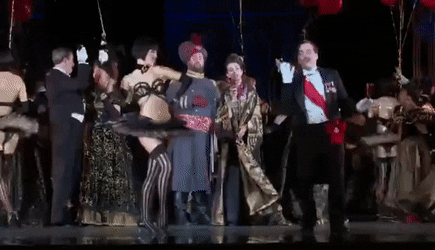
Johann Strauss’ Die Fledermaus walks the line between opera and operetta. It is performed at the world’s leading opera houses (like the Met in NYC), which usually sniffily shun operettas. Interestingly when it was first performed in Vienna at the Theatre an der Wien in 1874, it was to an unmoved audience. It wouldn’t be for another two years that the Viennese audience took to the operetta, and another 16 years before the Vienna Opera added Die Fledermaus to its repertoire. But now it’s well known and beloved all over the world. I know from experience that it’s also a go-to piece for Gilbert and Sullivan societies looking to mix up their annual repertoire. It is frequently performed in English in English-speaking countries, but it is also frequently performed in the original German in English-speaking countries. It has gotten the Regie treatment - which operettas are usually spared–on several occasions, but when directors aren’t super-imposing dark political or psychological messages onto it, it’s about as silly and contentless as an opera/etta could possibly be. I love it.
Johann Strauss the younger of course modelled his operettas on Jacques Offenbach, the 19th Century French composer. Strauss’s satire was often generic, unlike Offenbach who commented on real-life matters. Also unlike Offenbach’s, and other operettas of the time, Die Fledermaus relies on the power of the orchestra, and only one role can be performed by an untrained voice.
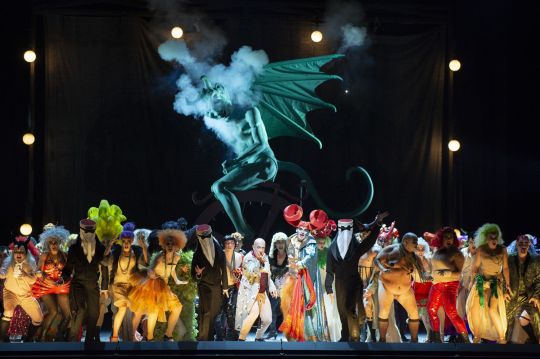
I do enjoy the works of Jacques Offenbach. Which is just as well as he is credited with inventing the operetta art form and composing over 100 of them. His achievement of course paved the way for Strauss, Gilbert & Sullivan, and the musicals of the 20th century, which stemmed from the genre.
I have enjoyed watching and listening to his works such as Orpheus in the Underworld (Orphée aux enfers), and Beautiful Helen (La belle Helene). Up until 1858, when Offenbach composed Orpheus, his theatrical licence prevented him from staging any operas with more than one act, or four characters. After negotiation (with Napoleon III’s government) he was finally allowed to stage full-length operettas, and Orpheus in the Underworld was premiered. To get back at the young Napoleon’s strict regime, Offenbach wrote an operetta that satirised Paris and its government. Surprisingly, the emperor allowed Offenbach to stage the operetta without any censoring.
Austro-Hungarian composer Franz Lehár’s operetta Die lustige Witwe (The Merry Widow), is one I do enjoy immensely. The melodies and songs - Vilja, The Merry Widow Waltz, You’ll Find Me At Maxim’s, to name but a few - are lovingly played and sung the whole world over, making it one of the surest box-office attractions of all time.
There is no question I think that the Austro-Hungarian Franz Lehár revitalised the world of Viennese operetta after the golden age of this genre with composers such as Suppé, Strauss and Millöcker was over. While Strauss, who transplanted the light waltz of the 19th-century bourgeoisie into Offenbach’s harshly satirical tradition, is regarded as the inventor of the Viennese operetta, Lehár’s The Merry Widow was an extraordinary and unexpected success in the Vienna of Freud, Mahler, Schnitzler and Schönberg. It was Lehar’s merit to have revived this genre to much critical acclaim.
Apparently, Hitler referred to the operetta as ‘the equal of the finest opera,’ and it is rumoured to be the only piece of music the dictator would play during the last two years of the war. Thankfully, Lehár and his operetta remain untarnished by their association with Hitler, largely because the composer kept a low profile during the war and died shortly afterwards. The Merry Widow is still popular worldwide. And rightly so.
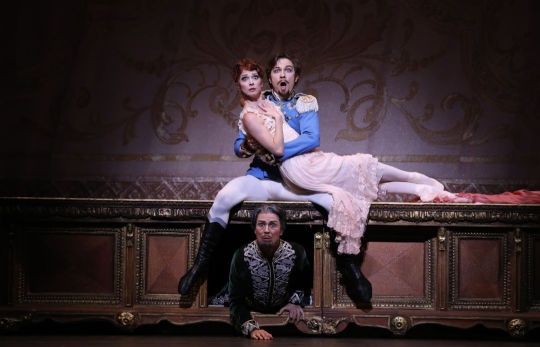
One reason why I love it is within the story itself. Today, Hanna would be called a modern woman. At the time of the world premiere in 1905 such a role design caused a sensation. Valencienne, on the other hand, is the counterpart to her; she corresponds more to the traditional, conservative role model.
So I would put Die Fledermaus, Orphée aux Enfers, and Die Lustige Witwe in the tier one of operettas.
But it’s the next tier that I have a more personal attachment to and those would be the operettas of Gilbert & Sullivan. And why not? They are such jolly good fun and an immensely enjoyable spectacle.
I have known G&S aficionados get sniffy or bristle with annoyance about G&S works being described as operattas - including many of the older generations in my family. One of my great aunts practically snorts with disdain in her dram of Scotch whisky at the very suggestion. She just sees that as another sign of civilisational decay. I think Gilbert & Sullivan themselves thought of their works as comic operas more than anything else.
But they do share one major trait with Offenbach and that is they do satire in such biting ways. Indeed they often poke fun at the establishment and use wit and humour as a way of expressing political opinion. But what sets them apart from everyone, including Offenbach, is how unpretentious they are in the music and to tell it as a story with such gaeity and wit that puts on dry English humour at its best.
I would say The Mikado, Iolanthe, and The Pirates of Penzance would be three of my favourite G&S comic operas from the fourteen they did.

Before Gilbert, a lawyer by training, died in 1911 he asked that The Mikado, an operetta set in Japan (although in fact a commentary on British issues), be updated to reflect current issues. Indeed it’s one of the many highlights that I love the most about The Mikado is how inventive they are going to be when they come to do ‘It’s on the list’. As G&S afficianados know ‘The List’ is list of gripes on current personalities and current affairs that have nothing to do with the opera. It’s very funny.
One of my favourite parts of The Pirates of Penzance’s is the famous Major General’s song that parodies the military leader who, although well educated, knows basically nothing about warfare or technology.
Another favourite of mine is from The Mikado - the beloved Three Little Maids From School Are We.
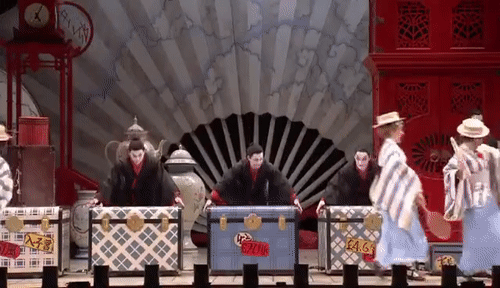
Other operettas on my list would include, in no order:
Auber - Haydée ou Le Secret Bernstein - Candide Carl Zeller - Der Vogelhändler Chabrier - L'Étoile Franz von Suppé - Boccaccio Gilbert & Sullivan - H.M.S. Pinafore Johan Strauss II - Der Zigeunerbaron Karl Joseph Millöcker - Der Bettelstudent Karl Joseph Millöcker - Gasparone Lehár - Das Land des Lächelns Lehár - Zigeunerliebe Offenbach - La Vie Parisienne Offenbach - La Belle Hélène
Thanks for your question
18 notes
·
View notes
Text
Carmen Sandiego and Carmen (Opera)
Episode 6 titled “The Opera in the Outback Caper”, displayed the famous opera of Carmen where a notable song called Habanera is played by Georges Bizet. I decided to delve deeper into the play itself to see if I could try to pull out anything that could be connected to the show thanks to seeing @anini--chan‘s post (link is provided below in the section about song itself). This is also to provide background knowledge of the opera.
Summary
Takes place in Spain with a man called Don Jose who is considered naive and seduced by Carmen
Result is he leaves behind his childhood sweetheart and leaves the military
A matador called Escamillo becomes Carmen’s new love interest which leads to Jose killing Carmen out of jealousy
In more detail
Act 1:
Carmen begins to sing Habanera about “untameable nature of love” and throws a flower to Jose who seems rather annoyed by her
Jose gets a letter via Micaela about his mother wishing for him to marry Micaela to which he agrees
In charge of taking Carmen to prison (currently have hands tied up), she begins to sing and dance which enchants him and he let’s her go. He is then arrested for 2 months
Act 2:
Carmen waits for Jose who is currently in jail for 2 months, the matador guy tries to flirt with her, but her priority is Jose
He is out and Carmen tries to win him by exotic dance, she succeeds
She proposes that Jose leaves with her, he is unsure. Though after Jose attacked a superior officers, he is left with no choice but to join her
Act 3:
Carmen remarks how she is bored with Jose
Carmen’s friends do some fortune telling saying Carmen and Jose will die
The matador guy comes and says he is still in love with Carmen which angers Jose
Jose eventually leaves with Micaela cause his mother is sick, not cause he will marry Micaela
Act 4:
Carmen and matador confess their love for one another (talk about moving on fast)
Friends warn Carmen about Jose, but she still wants to talk to him
Jose gives her a ring and she throws it, turning to walk away
Jose stabs her and sings a song confessing her killed her
Things to note
Carmen is a gypsy
Jose was part of a military, but was punished followed by him leaving it behind
Two love interest for each
Carmen has Jose and Escamillo
Jose has Carmen and Micaela
Carmen is described as a new type of hero who is more edgy and not the innocent type, but she has strong belief as said that she would rather die than not be true to herself
Sexual and jealousy
Music inspired by flamenco
"L'amour est un oiseau rebelle"
Brief summary of an analysis by @anini--chan (make sure to check out her post!) concerning the song with Carmen and Graham.
Before she approaches Graham she is gliding/ flying down to him
Flying or being in the air is associated with birds
Song translates to “love is a rebellious bird”
Rebellious is what Carmen is as she went against VILE and birds/flying is connoted to freedom
Actual info on the song
Love is said to be rebellious because it happens when it happens as said by user sebastiantreichl “it knows no border and no laws, no prohibitions or taboos” (Genius)
Something fun and interesting to point out
In the animated direct to home film, Mickey, Donald, and Goofy: The Three Musketeers, the same song is played with the same instrumental just words played around with, when Clarabelle Cow was going to drown Goofy who was tied up in an anchor. During the song is where both fall in love and leading to Clarabelle to have a change of heart and help Goofy save his friends.
Connection to CS
It’s the opera play that is being shown in Sydney where Graham is currently at
Share same name as titular character, Carmen jokes about the Opera! Carmen being her bff
When Carmen responds to Graham’s question of her name and tells him. He laughs, I don’t know if it’s a “yeah sure your name is [blank]” cause it’s a coincidence the same play that is being performed is called Carmen.

Maybe it is a setup for a love triangle romance? (This is a very far reach idea, so you can ignore this)
The play deals with love triangles which is making me nervous laugh
I feel there must be more to the show decided to focus on the opera of Carmen than just “hey an opera that is named Carmen!”
I mean VILE is sort of a military in the sense that it trains people under the same cause. Jose left and so did Graham (well more than kicked out with getting his memory erased)
Unlike Opera!Carmen, Carmen did not pressure Graham to be with her and instead opted to not meet him in order to let him live his life without danger.
If you guys think of any more please add! I just wrote an essay and my head hurts lol
Also don’t these two picture break your heart?


THOSE SOFT SMILES!!!! I'M UGLY CRYING RN
#carmen sandiego#cs#graham crackle#red crackle#cs gray#cs carmen#carmen x graham#carmen x gray#mini analysis#lowkey proud of myself for researching this#those two last pics break my heart
55 notes
·
View notes
Text
BE YOUR HUSBAND’S BEST FRIEND
December 4, 1948
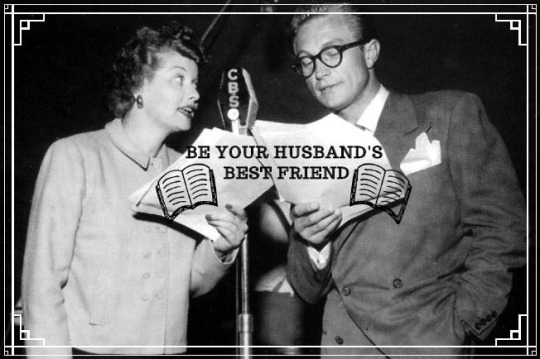
“Be Your Husband’s Best Friend” (aka “Be a Pal to Your Husband”) is episode #21 of the radio series MY FAVORITE HUSBAND broadcast on December 4, 1948.
Synopsis ~ Liz buys a book that says that the way to get along with your husband is to share all of his interests. With that in mind, she joins him in a poker game and tags along on a camping trip.
Note: This episode was aired before the characters names were changed from Cugat to Cooper. It was also before Jell-O came aboard to sponsor the show and before the regular cast featured Bea Benadaret and Gale Gordon as the Atterburys.
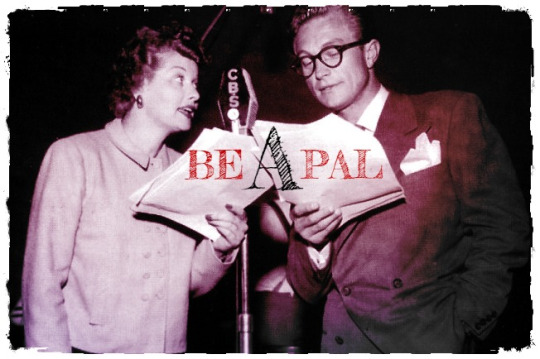
The script was also re-written as a 1950 episode of “My Favorite Husband” also titled “Be a Pal” and broadcast June 18, 1950. This was to account for the change in the characters surnames from Cugat to Cooper.
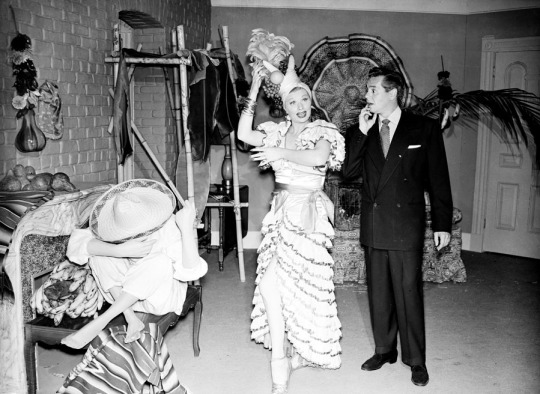
This program was also the basis for the “I Love Lucy” episode "Be a Pal" (ILL S1;E2) filmed on September 21, 1951 and first aired on October 22, 1951. The main difference is the radio versions do not include the famous Carmen Miranda lipsynch scene.
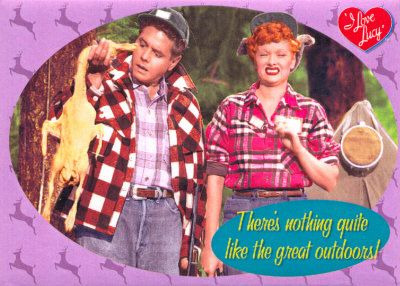
This radio version also contains story elements in its second half that were later incorporated into “The Camping Trip” (ILL S2;E29).
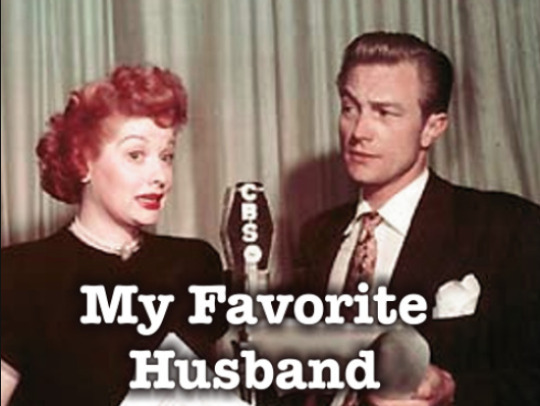
“My Favorite Husband” was based on the novels Mr. and Mrs. Cugat, the Record of a Happy Marriage (1940) and Outside Eden (1945) by Isabel Scott Rorick, which had previously been adapted into the film Are Husbands Necessary? (1942). “My Favorite Husband” was first broadcast as a one-time special on July 5, 1948. Lucille Ball and Lee Bowman played the characters of Liz and George Cugat, and a positive response to this broadcast convinced CBS to launch “My Favorite Husband” as a series. Bowman was not available Richard Denning was cast as George. On January 7, 1949, confusion with bandleader Xavier Cugat prompted a name change to Cooper. On this same episode Jell-O became its sponsor. A total of 124 episodes of the program aired from July 23, 1948 through March 31, 1951. After about ten episodes had been written, writers Fox and Davenport departed and three new writers took over – Bob Carroll, Jr., Madelyn Pugh, and head writer/producer Jess Oppenheimer. In March 1949 Gale Gordon took over the existing role of George’s boss, Rudolph Atterbury, and Bea Benaderet was added as his wife, Iris. CBS brought “My Favorite Husband” to television in 1953, starring Joan Caulfield and Barry Nelson as Liz and George Cooper. The television version ran two-and-a-half seasons, from September 1953 through December 1955, running concurrently with “I Love Lucy.” It was produced live at CBS Television City for most of its run, until switching to film for a truncated third season filmed (ironically) at Desilu and recasting Liz Cooper with Vanessa Brown.
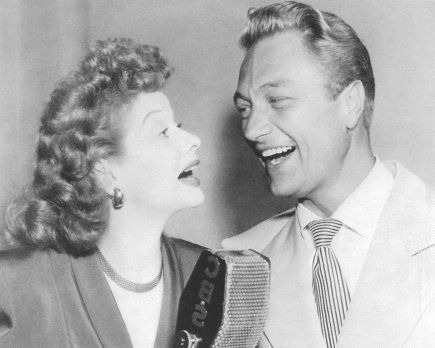
MAIN CAST
Lucille Ball (Liz Cugat) was born on August 6, 1911 in Jamestown, New York. She began her screen career in 1933 and was known in Hollywood as ‘Queen of the B’s’ due to her many appearances in ‘B’ movies. “My Favorite Husband” eventually led to the creation of “I Love Lucy,” a television situation comedy in which she co-starred with her real-life husband, Latin bandleader Desi Arnaz. The program was phenomenally successful, allowing the couple to purchase what was once RKO Studios, re-naming it Desilu. When the show ended in 1960 (in an hour-long format known as “The Lucy-Desi Comedy Hour”) so did Lucy and Desi’s marriage. In 1962, hoping to keep Desilu financially solvent, Lucy returned to the sitcom format with “The Lucy Show,” which lasted six seasons. She followed that with a similar sitcom “Here’s Lucy” co-starring with her real-life children, Lucie and Desi Jr., as well as Gale Gordon, who had joined the cast of “The Lucy Show” during season two. Before her death in 1989, Lucy made one more attempt at a sitcom with “Life With Lucy,” also with Gordon.
Richard Denning (George Cugat) was born Louis Albert Heindrich Denninger Jr., in Poughkeepsie, New York. When he was 18 months old, his family moved to Los Angeles. Plans called for him to take over his father’s garment manufacturing business, but he developed an interest in acting. Denning enlisted in the US Navy during World War II. He is best known for his roles in various science fiction and horror films of the 1950s. Although he teamed with Lucille Ball on radio in “My Favorite Husband,” the two never acted together on screen. While “I Love Lucy” was on the air, he was seen on another CBS TV series, “Mr. & Mrs. North.” From 1968 to 1980 he played the Governor on “Hawaii 5-0″, his final role. He died in 1998 at age 84.
Ruth Perrott (Katie, the Maid) was also later seen on “I Love Lucy.” She first played Mrs. Pomerantz, a member of the surprise investigating committee for the Society Matrons League in “Pioneer Women” (ILL S1;E25), as one of the member of the Wednesday Afternoon Fine Arts League in “Lucy and Ethel Buy the Same Dress” (ILL S3;E3), and also played a nurse when “Lucy Goes to the Hospital” (ILL S2;E16). She died in 1996 at the age of 96.
In this episode we learn the names of all seven of Katie’s ex-husbands: Clarence, Peter, Harold, Oscar, Engelbert, and Yancy.
Bob LeMond (Announcer) also served as the announcer for the pilot episode of “I Love Lucy”. When the long-lost pilot was finally discovered in 1990, a few moments of the opening narration were damaged and lost, so LeMond – fifty years later – recreated the narration for the CBS special and subsequent DVD release.
GUEST CAST
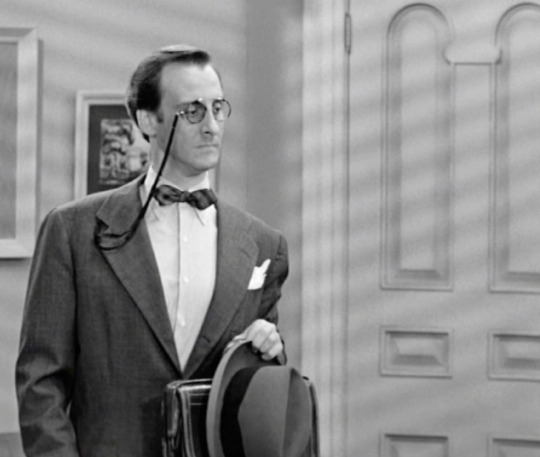
Hans Conried (Professor Philpot Millmoss) first co-starred with Lucille Ball in The Big Street (1942). He then appeared on “I Love Lucy” as used furniture man Dan Jenkins in “Redecorating” (ILL S2;E8) and later that same season as Percy Livermore in “Lucy Hires an English Tutor” (ILL S2;E13) – both in 1952. The following year he began an association with Disney by voicing Captain Hook in Peter Pan. On “The Lucy Show” he played Professor Gitterman in “Lucy’s Barbershop Quartet” (TLS S1;E19) and in “Lucy Plays Cleopatra” (TLS S2;E1). He was probably best known as Uncle Tonoose on “Make Room for Daddy” starring Danny Thomas, which was filmed on the Desilu lot. He joined Thomas on a season 6 episode of “Here’s Lucy” in 1973. He died in 1982 at age 64.
Conried will recreate this role in 1950, when the script is rewritten for the Coopers as “Be A Pal.” The only difference is that his first name is Philip, not Philpot. On television, the author remains off screen throughout.
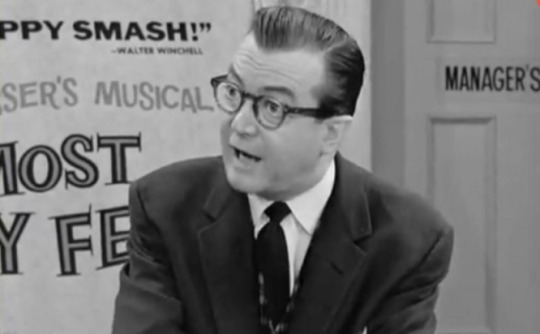
Joseph Kearns (Joe, Poker Player) appeared on “I Love Lucy” as the psychiatrist in “The Kleptomaniac” (ILL S1;E27) and later played the theatre manager in “Lucy’s Night in Town” (ILL S6;E22). His most famous role was as Mr. Wilson on TV’s “Dennis the Menace” (1959). When he passed away during the show’s final season, Lucy regular Gale Gordon took over for him, playing his brother.
In future iterations of this script, this character’s dialogue is assumed by Mr. Atterbury (Gale Gordon) and on TV by Fred Mertz (William Frawley).
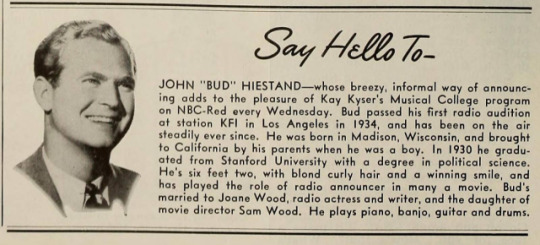
John Hiestand (Cory Cartwright) served as the announcer for the radio show “Let George Do It” from 1946 to 1950. In 1955 he did an episode of “Our Miss Brooks” opposite Gale Gordon. Cory was a regular character who was eventually written out of the series when the Atterbury’s (Gale Gordon and Bea Bendaret) were introduced.
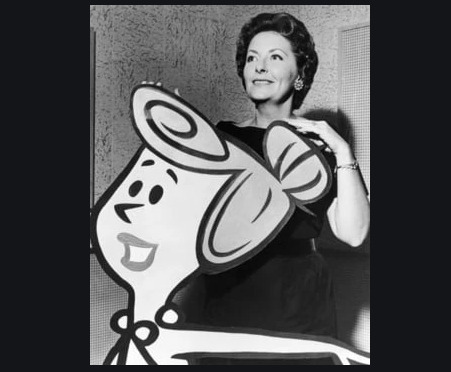
Jean Vander Pyl (Marge) is best known as the voice of Wilma Flintstone for the Hanna-Barbera cartoon “The Flintstones.” Coincidentally, Wilma’s best friend was voiced by Bea Benadaret, who will later play Iris Atterbury, Liz’s best friend on “My Favorite Husband.” On radio she was heard on such programs as “The Halls of Ivy” (1950–52) and on “Father Knows Best” before it moved to TV. She died in 1999 at age 79.
THE EPISODE
ANNOUNCER: “Let’s look in on the Cugats and see what they’re doing. Oh, but hold your hats. Liz and George are having an argument about their plans for their evening. Liz wants to go to a symphony concert and George wants to have a poker game! (As a fight announcer) And in this corner wearing a pink satin housecoat and weighing 120 pounds, ‘Battling Liz Cugat.’ And in this corner wearing a grey pinstripe suit and weighing 170 pounds is her husband ‘Gorgeous George’. Well, the first round ended in a draw and here comes the second round!”
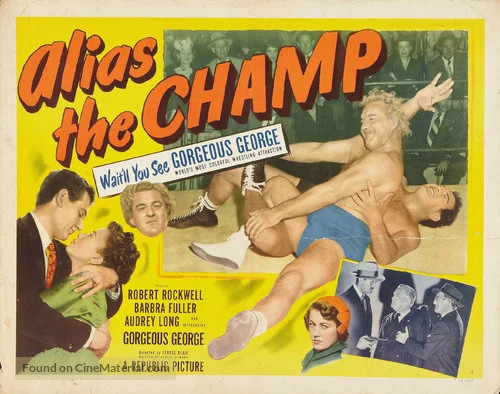
‘Gorgeous George’ was the stage name of professional wrestler George Raymond Wagner (1915–63), so named because of his long, blonde hair. He was mentioned on “I Love Lucy” in “Pioneer Women” (ILL S1;E25) and “Ricky’s Movie Offer” (ILL S4;E6).
Liz and George lament that they argue so much since getting married. George wonders why men have to wear formal clothes to a concert.
LIZ: “Because when they fall asleep the stiff shirt keeps them from falling over.”
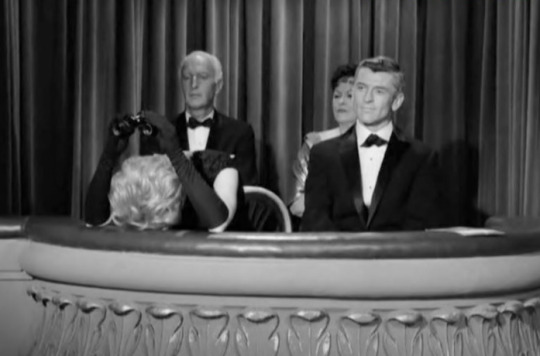
In “Lucy the Music Lover” (TLS S1;E8) it was Lucy Carmichael, not her tuxedo-clad date, that fell asleep during a classical music concert. At least she didn’t drop her opera glasses!
Liz turns on the waterworks, but George still refuses to go to the concert.
GEORGE: “And I hope Leopold falls flat on his Stokowski!”
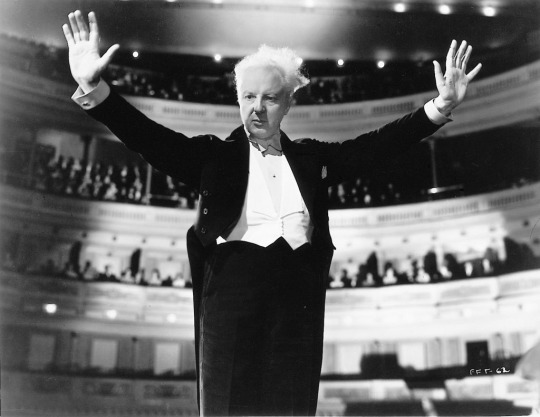
Leopold Stokowski (1882-1977) was one of the leading conductors of the early and mid-20th century, he is best known for his long association with the Philadelphia Orchestra and his appearance in Disney’s Fantasia (1940) with that orchestra.
Liz tells Katie the Maid she will be going to a woman’s club luncheon to hear a talk about marriage. Katie tells her that she has been married six times: Peter, Harold, Oscar, Engelbert, and Yancy, which she remembers because it spells out ‘P.H.O.E.Y’. She’s intentionally left off her first husband Clarence because it wouldn’t spell ‘phoey’!
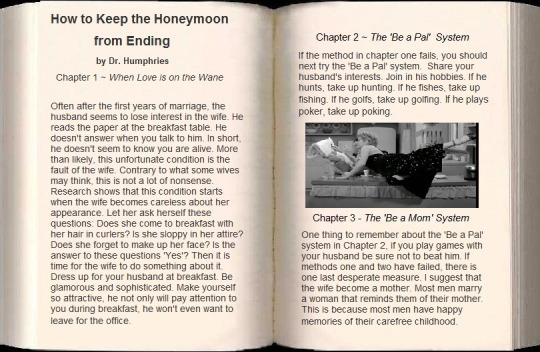
At their club luncheon, Liz and Marge (Jean Vander Pyl) listen to a guest speaker talk about “How To Be Happy, Though Married”. Professor Philpot Millmoss (Hans Conried) suggests the ladies be a pal to their husbands. Liz wonders why it has to be the woman who gives in - but Millmoss tells her to consult his new book on sale at the door for seventy nine cents.
Note: In the 1950 revision, Marge was replaced with Iris (Bea Benadaret), but the author was still played by Hans Conried. In the television version, the author remains off screen and Ethel Mertz (Vivian Vance) takes the Marge / Iris lines.
Liz resolves to employ the “Be A Pal Treatment” with George and sits beside him to read the evening newspaper. Liz pretends to be interested in the sports section.
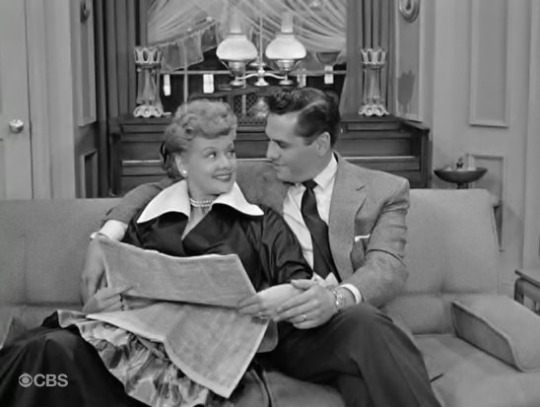
LIZ (reading): “Williams Bags Crown By TKO in eighth.″
Liz pronounces TKO phonetically as ‘Tuh-Ko” although George corrects her. The exchange was repeated verbatim between Lucy and Ricky in “The Camping Trip.”
LIZ (reading): “Midget Racing! They oughta be ashamed making those little men run around the track.”
George sarcastically calls Liz Ted Husing, and then Red Barbar.
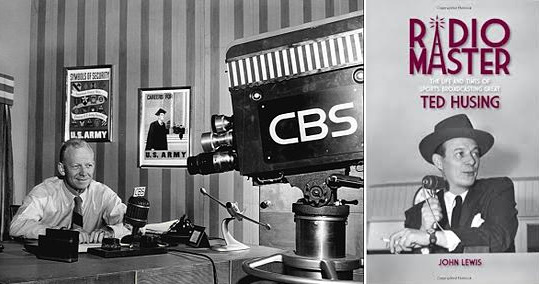
Ted Husing (1901-62) was one of CBS Radio’s most popular sportscasters. By 1950 his salary was an astronomical million dollars! Red Barber (1908-92) was a play-by-play announcer for major league baseball, then announcing for the Brooklyn Dodgers and holding down his own CBS TV sports show “Red Barber’s Club House.”
LIZ (reading): “They’re racing little girls! It says so right here,‘Yesterday at Tanforan a race was won by a three year-old maiden!’ She certainly was carrying a lot of money for a little girl. She had $2,000 in her purse.”
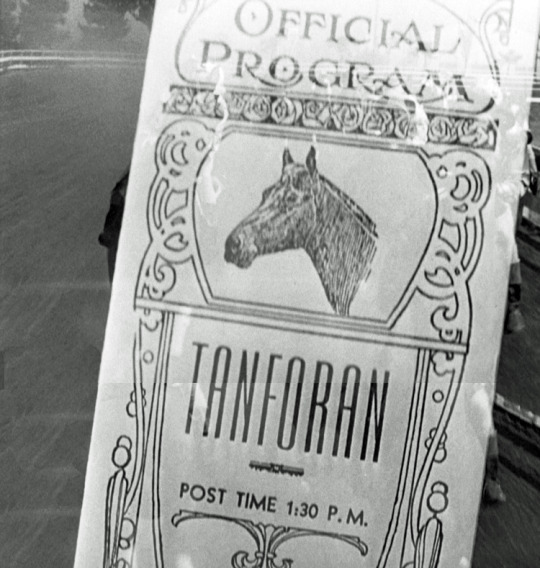
The line is virtually identical on television, except that Tanforan (a horse racetrack outside San Francisco) was changed to the more familiar Churchill Downs.
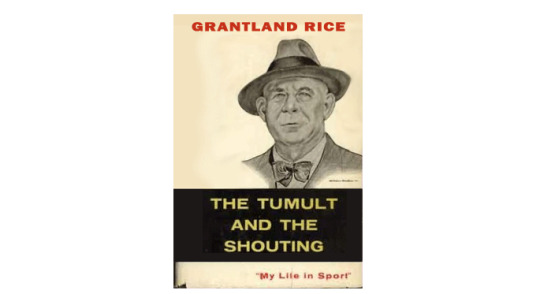
George / Ricky then refers to Liz / Lucy as Grantland Rice (1880–1954), a sportswriter known for his elegant prose, although the reference was removed for TV syndication when Rice died in 1954. It was restored for the DVD release. Clueless Liz / Lucy think he is a food!
Liz is determined to join in the poker game that evening, despite not knowing anything about the card game. Lucy also tried this tactic in the television version of “Be A Pal”. The other poker players are Joe (Joseph Kearns) and Cory Cartwright (John Hiestand), George’s bachelor friend.
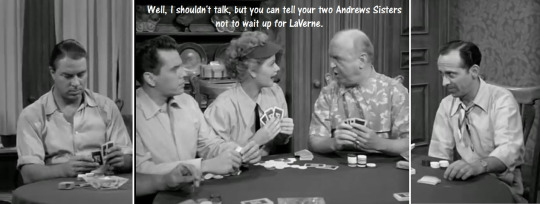
In the 1950 radio re-write, Joe was voiced by Hans Conried (doubling with Millmoss) and Gale Gordon as Mr. Atterbury, a role previously played in earlier episodes by Hans Conried. On television, the poker players were Fred Mertz (William Frawley), Hank (Richard Reeves, left) and Charlie (Tony Michaels, right).
LIZ CUGAT / LIZ COOPER / LUCY RICARDO (looking over her cards): “There’s her sister! What do you have?”
JOE / MR. ATTERBURY / FRED: “I shouldn’t talk, but tell your two Andrews Sisters not to wait up for LaVerne!”
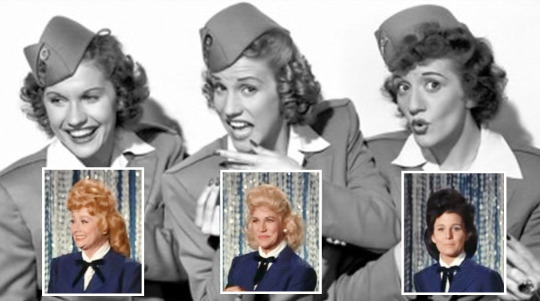
The Andrews Sisters were a close-harmony singing group most popular during World War II. In 1969 Lucy played LaVerne Andrews on an episode of “Here’s Lucy” that guest-starred Patty Andrews as herself. Lucie Arnaz took the role of the third Andrews sister, Maxene.
A few days later, George confides in Cory that Liz has been driving him crazy by sticking to his side like glue, trying to be interested in everything that he is. George decides to go away on a camping trip to get away from her for a while. Cory suggests that George take Liz with him and make the trip so rigorous that she will regret trying to ‘be a pal’.
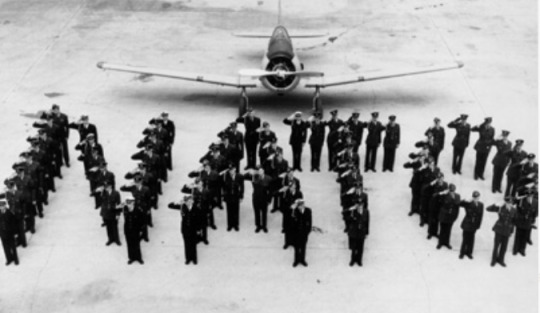
At the end of Act One, there is a public service announcement about NATO - the newly-formed North Atlantic Treaty Organization.
Katie warns Liz about her husband’s plan, having overheard George and Cory talking. Liz spills the beans to Cory and blackmails him to turn the tables on George at the campsite.
Liz and George engage in a fishing contest, just like Lucy and Ricky in “The Camping Trip”. When Liz pretends to know all about fishing, George calls her sarcastically dubs her Izaak Walton.
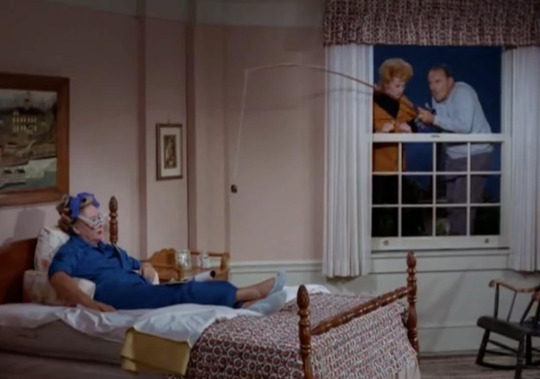
Izaak Walton (1594-1683) was an English writer known for The Compleat Angler (1653), a famous prose and poetry celebration of fishing. His name was mentioned by Mr. Mooney before ‘fishing’ for Viv’s glasses in “The Loophole in the Lease” (TLS S2;E12) in 1963.
Once George is out of sight, Cory arrives with some store-bought fish to fool George.
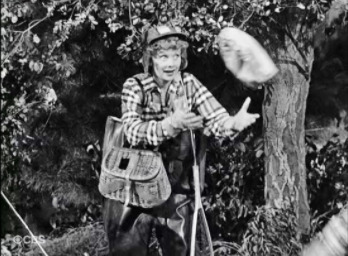
LIZ: “Throw them to me, Cory. That way I can tell George I caught 'em.”
George and Liz decide to bet on who can hike back to the campsite fastest. Luckily, Liz has Cory waiting in a car to assure that she wins!
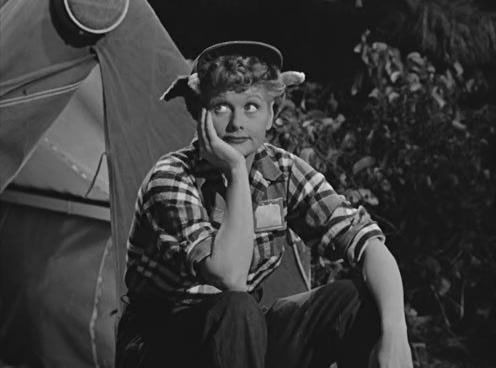
Back at camp, Liz is patiently waiting for George, who trudges in weary and parched. Liz confesses that she got back so early she had time to wash her hair so there is no water.
Next morning Liz and Cory conspire to make George think she’s an expert duck hunter and sharp-shooter! Liz takes aim at the tree, and on cue Cory tosses a duck at her feet.
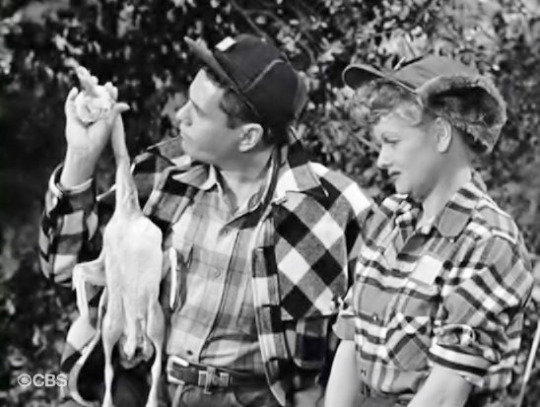
GEORGE: “I don’t get it. Liz. First you catch a Lake Trout in a stream, now you shoot a duck marked Birds Eye Frozen Foods!”
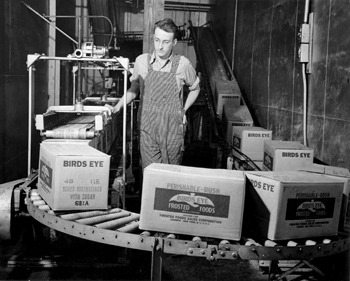
In the early 1900s, Clarence Frank Birdseye II of Montclair, New Jersey, received patents for the development of improved methods to freeze fish for commercial production. In 1922, he formed a company, Birdseye Seafood, Inc., Birdseye created a new company, General Seafood Corporation, to promote this method. In 1929, Birdseye sold his company and patents for $22 million to General Foods Corporation which founded the Birds Eye Frozen Food Company. Although primarily marketing frozen vegetables, they have occasionally sold other foods as well.
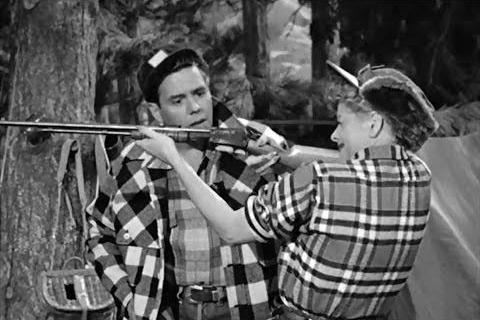
A target practice ensues where a discretely hidden away Cory clangs an anvil every time Liz shoots at a distant horseshoe. A suspicious George gets wise to Cory and Liz’s scheme and trains his rifle on on the tree. A frightened Cory comes down but all ends happily.
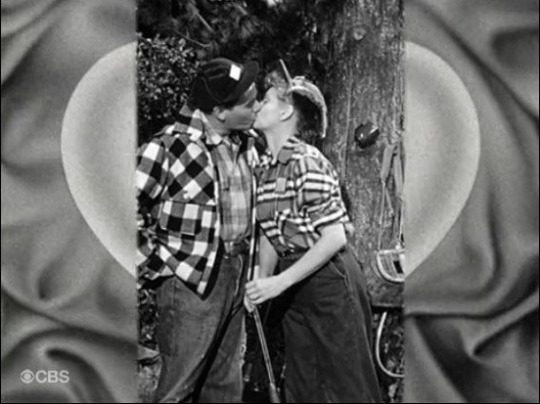
LIZ (to George): “Let’s not be pals or companions. Let’s not be even be friends anymore. Let’s just go back to being man and wife.”
In the bedtime tag, Liz tries to wake a sleeping George. She sees a note pinned to his chest that says:
DEAR PAL. YES, I AM ASLEEP. I TOOK A SLEEPING PILL TO MAKE SURE OF IT. GOOD NIGHT.
LIZ: “Aww...isn’t he cute? Goodnight, George.”
#My Favorite Husband#Be A Pal#The Camping Trip#I Love Lucy#Richard Denning#Lucille Ball#Hans Conried#Jean Vander Pyl#Birdseye#Duck Hunting#Izaak Walton#NATO#Clarence Birdseye#Birds Eye Frozen Foods#Grantland Rice#The Andrews Sisters#Red Barber#Ted Husing#Tanforan#Leopold Stokowski#Radio#1948#John Hiestand#Gorgeous George#Ruth Perrott#Bob LeMond#CBS Radio#Desi Arnaz#Joseph Kearns#Richard Reeves
0 notes